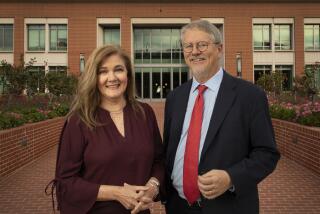Addressing an ‘Immediate Need’
- Share via
They already run a Santa Ana shelter for homeless men and one for homeless mothers with children. Now they have their sights set on another segment of Orange County’s homeless population, one they say has long been overlooked despite its growth: those living with HIV and AIDS.
“We’ve had medical advances, yes, and those advances have resulted in a reduced death rate,” said Larry Haynes, executive director of Mercy House Transitional Living Centers, a nonprofit organization that runs three other county shelters. “But more people than ever are living with HIV now. And that includes a significant number of our homeless.”
When it opens next summer, Emmanuel House will be Southern California’s first shelter built specifically for that cause, Haynes said, noting that several existing Orange County facilities have been converted to accommodate residents with HIV or AIDS. Officials know of only two other built-from-scratch shelters like Emmanuel House in the country, he said.
Haynes and dozens of supporters and organizers recently showed off the new property, a two-story building under construction in Santa Ana’s historic French Park neighborhood. The 14,335-square-foot shelter will provide beds for 21 men and women, as well as four bedrooms for live-in staff members.
Designed to reflect the neighborhood’s turn-of-the-century, Craftsman-style architecture, Emmanuel House will have wide eaves, deep porches and broad windows. The shelter will have a living room, dining room, patio deck and library to encourage social interaction among the residents, as well as “private space” for solitude, officials said.
The project is being developed by HomeAid Orange County, a nonprofit housing company that helps build and renovate shelters for the homeless. Costing $3.3 million, Emmanuel House is one of the largest and most expensive of HomeAid’s 30 projects, said director Scott Larson. Funding includes about $400,000 of federal money and $100,000 from the county. The balance comes primarily from the private sector, through Mercy House fund-raisers and corporate gifts.
“There’s an immediate need for this type of shelter,” Larson said. “It will definitely fill a void.”
Emmanuel House residents will have access to support services such as job counseling and personal planning to help them overcome the barriers to permanent housing, Haynes said. The shelter’s staff will also help residents with their economic, emotional and spiritual well-being as they adjust to life in safe and secure surroundings. Officials estimate that residents will stay about two years at the shelter before moving on, although that time frame could vary depending on individual needs and medical issues.
“We hope we can reduce the vulnerability that so many people with HIV face every day, even without the added anxiety of being homeless,” Haynes said.
By stabilizing their housing environment, Emmanuel House will also give residents a chance to take advantage of the drug therapies and other treatments that are available. Many homeless people who are living with HIV or AIDS must drift from shelter to shelter, receiving intermittent medical care that yields few results.
“Some of the people I know have to take these pills multiple times throughout the day,” Haynes said. “If you’re homeless, it can be difficult to stay on a regimen.”
The project has been overwhelmingly embraced by French Park neighbors, who say that Mercy House’s reputation and cooperative spirit with its two other shelter projects helped them accept the latest plan so readily.
“These properties are always immaculate and very, very well-maintained--better than some of my own neighbors even,” said Paul Giles, president of the French Park Neighborhood Assn. “And from the beginning, [Mercy House] worked with us and listened to us and let us know we had a say.”
*
Officials estimate that about 1,300 of the county’s 14,000 homeless are living with HIV or AIDS. Social services, churches and other referrals will be used to help find the first residents of Emmanuel House, which is named after the angel of mercy as recognized by the Catholic diocese. The church set up Mercy House a decade ago to provide temporary housing for the homeless.
“What people need to hear again is that we still do not have a cure for AIDS,” Haynes said. “And by no means have we solved the problem. But we’re chipping away at it.”
More to Read
Sign up for Essential California
The most important California stories and recommendations in your inbox every morning.
You may occasionally receive promotional content from the Los Angeles Times.













